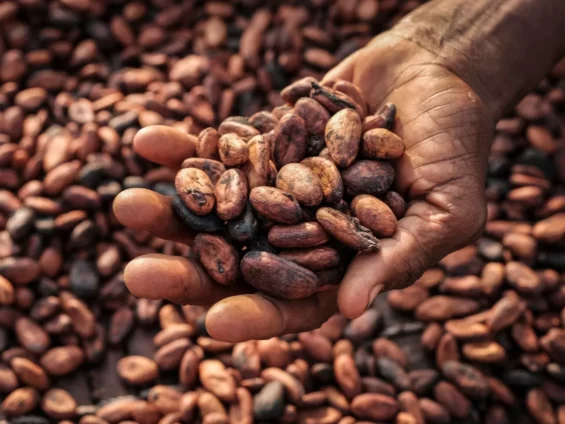Ghana’s Cocobod will use part of a $200 million World Bank loan to rehabilitate plantations destroyed by the cocoa swollen shoot virus, which causes drops in yields and kills trees, the regulator’s deputy Chief Executive in charge of operations said on Thursday.
The disease has wiped off about 500,000 hectares of farmlands and reduced cocoa output from the West African nation, the world’s second biggest cocoa producer after neighbour Ivory Coast.
Ghana’s output declined to 600,000 metric tons last year after peaking at 1.048 million tons in the 2020/21 season, as the cocoa swollen shoot virus, aging plantations, illegal mining and smuggling took a toll on the sector.
A total of $132.8 million of the loan secured by the government last year and the counterpart funding will finance Cocobod’s rehabilitation of farms and help to enhance knowledge on the virus strains, a project information document showed.
“The rehabilitation will take a minimum of five years to start getting economic production,” Cocobod’s Emmanuel Opoku told Reuters, adding that efforts had been hampered by the country’s economic crisis and the board’s limited funds.
The board will take over disease-infested farms, cut and replace sick cocoa trees, aiding growth to a fruiting stage before handing them back to farmers.
In 2018, Cocobod used part of a $600 million Africa Development Bank (AfDB) loan to rehabilitate aging plantations and those affected by the disease.
But the programme, originally meant to cover 156,000 hectares of plantations, was caught up in Ghana’s worst economic crisis in a generation during which inflation spiralled and the cedi currency depreciated sharply, Opoku said.
He said the AfDB facility benefited more than 88,000 hectares of farmlands, of which 40,000 hectares were ready to be given back to farmers in “the coming days”.
Alhassan Bukari, president of the country’s Cocoa, Coffee and Sheanut Farmers’ Association, told Reuters that rehabilitation efforts needed to be aggressive as many farmers were affected.
Ghana’s graded and sealed cocoa arrivals fell by 35% between the start of this season on Sept. 1 and Jan. 31 this year due to the intensity of the seasonal dry Harmattan wind and what Cocobod described as production challenges.
Latest Stories
-
Space scientists reveal shocking devastation of mining as 84,000 football fields of forests gone
33 minutes -
Space science under siege: Encroachment threatens research as scientists battle mining devastation
45 minutes -
Turkey’s opposition leader vows protests will continue ‘in every city’
54 minutes -
Zimbabwe president fires army chief ahead of planned protests
1 hour -
Trump names conservative media critic as US ambassador to South Africa
1 hour -
US officials begin trade talks in Delhi as tariff deadline nears
1 hour -
Niger junta sets out five-year transition to constitutional rule
2 hours -
China tariffs may be cut to seal TikTok sale, Trump says
2 hours -
Militants kill 16 on Nigerian army base, military outpost, security sources say
2 hours -
Trump announces 25% tariffs on car imports to US
2 hours -
Suspect remanded in domestic violence case
3 hours -
Labour, 36, jailed over mobile phone theft
4 hours -
Mahama likely to assent to E-Levy repeal bill on Thursday – Deputy Finance Minister
5 hours -
Some ladies join movie industry ready to sleep their way to fame – Jide Kosoko
6 hours -
Poland to suspend migrants’ right to apply for asylum
6 hours

